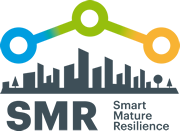The first workshop of the SMR project was organised by the council of Riga and took place from the 26th to the 29th of October 2015 in Riga, Latvia. The main objective of this first workshop in Riga was to gather useful information from experts regarding Critical Infrastructures (CI) and their dependencies to be able to develop the tools proposed in the project proposal. The attendees of the workshop included sixteen participants from the seven partner cities of Bristol, Donostia, Glasgow, Kristiansand, Riga, Rome and Vejle, and also a number of observers from academic-partner institutions.
In the case of each city, climate-related disasters were subsequently followed by reactions in city halls whether by means of legislation, infrastructure or simply greater prioritisation of the issue. Resilience-building would prevent the need for disasters to happen in order for preventative action to be taken, and each city is participating in SMR in order to be able to pre-empt these disaster situations.
The cities agreed that volunteers play a crucially important role in dealing with disasters and crisis. Secondly, they found that it is important to be prepared for unexpected circumstances. Finally, in each case, information and knowledge -sharing among stakeholders was agreed to be vital.
Flooding
Bristol, Riga, Vejle and Donostia found that they had all dealt with similar challenges related to flooding.
Bristol’s power and water supply were affected by flooding in 2007, which led to the introduction of new flood and water management legislation in 2010, which empower city councils and local coordinators to make more decisions regarding flooding.
In the spring of 2013, the main road between the east and the west of the city council in Riga was completely submerged and the transport system was unable to function as normal. In both Riga and Bristol’s case, flood events provoke cities into action. In both cases, local risk management strategies had also been developed to work with communities and different stakeholders.
In 1999, a heavy storm in Vejle caused a power outage that lasted for four days, causing manufacturing to grind to a halt for several businesses. This event led to companies planning alternative emergency supply generators for crisis situations, and also fostered networking and information sharing among electricity suppliers.
Donostia’s communication system was affected by flooding in 2007, incapacitating emergency services during the peak of the crisis. This led to the improvement of emergency services and alarm warnings that capitalise on neighbourhood outreach via social media. Companies and industries located in flood-prone areas have also been moved to lower-risk areas.
Snowstorms
In 2007, a heavy snowfall affected Kristiansand, confining people to their homes and gridlocking the city. The impact of the event was so high that intervention at the regional level and volunteer teams’ help were necessary. The following year, the city invested new equipment to improve their ability to respond to snowfalls. The snowfall event also fast-tracked the construction of an already-planned highway that was better prepared to deal with this type of crisis.
Crowding
The city of Rome presented the problems produced by the unexpected high affluence of people visiting Rome in 2005 because of the Pope’s funeral. 4 million people descended on the city and approximately 8.5 million people used the underground system in one week. Numerous volunteers provided their help to organise this event. This event also led to the overuse of some basic services like telecommunication and hotspots. To solve this, the city needed to increase the amount of infrastructures to ensure the provision of these basic services was founded. Therefore, local authorities delegated the responsibility to deal with this event to national authorities.
Electricity failure
Riga faced a blackout in electricity supply in 1980 and consequently the consumers were switched off the grid. After this event, they increased the number of electric supply infrastructure to prevent this from happening again.
In 1994, Glasgow was affected by flooding that had an economic impact on the city. This disaster led the authorities to think collectively at a strategic level and to develop risk plans to mitigate the flood impacts. Moreover, partnerships were created among private consultancies, private companies, and the Scottish water agency. In 2011, engineering works were developed to prevent flooding and these risk plans have been improved over the last years.
As a result of heavy snowfall in Riga during November 2013, the roof of a popular shopping mall collapsed under the accumulated snow, causing the deaths of fifty-seven people. Since this event, the societal awareness of the importance of structural building maintenance increased. A new construction department was also created in charge of analysing buildings and determining which buildings are no longer fit for use.
Click here to read the full report








